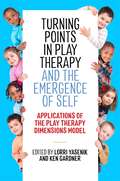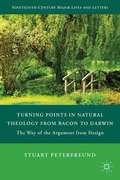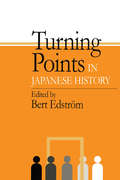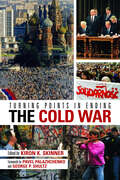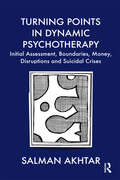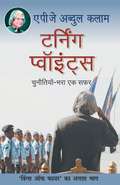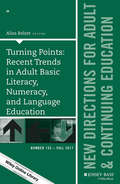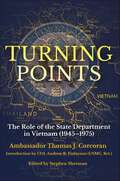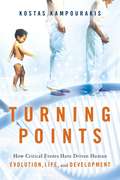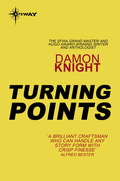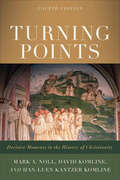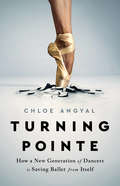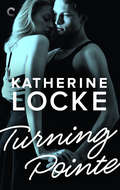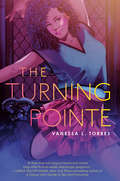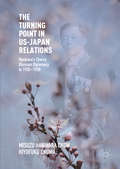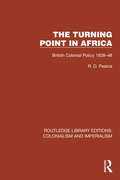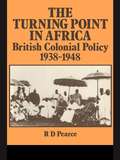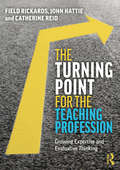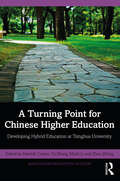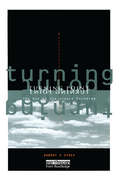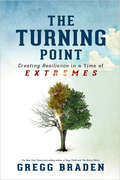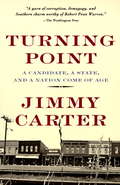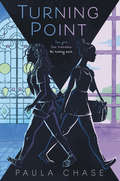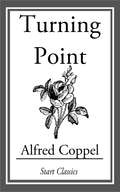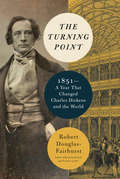- Table View
- List View
Turning Points in Play Therapy and the Emergence of Self: Applications of the Play Therapy Dimensions Model
by Lorri Yasenik Ken GardnerEffective clinical practice requires a thorough understanding of how turning points surface in the play therapy process. These moments can indicate a change in a child's thought or behaviour. The play therapist is the facilitator of these moments and this book will provide guidance on how they can promote these moments.This edited collection demonstrates successful implementation of the author's proven Play Therapy Dimensions Model. Each chapter uses this framework, as well as other theories, to discuss the markers that can reflect shifts and growth in a child's development. Full of applied guidance, this book will prove to be invaluable for practitioners, instructors and students.
Turning Points in Natural Theology from Bacon to Darwin
by Stuart PeterfreundDiscusses crucial moments in the historical development of natural theology in England from the time of Francis Bacon to that of Charles Darwin. While the argument from design remains the rhetorical method of choice for natural theologians throughout the three centuries in question, the locus and object of design undergo a change.
Turning Points in Japanese History
by Bert EdströmSo-called 'turning points' or 'defining moments' are both the oxygen and grid lines that historians and researchers seek in plotting the path of social and political development of any country. In the case of Japan, the ninth Conference of the European Association of Japanese Studies provided a unique opportunity for leading scholars of Japanese history, politics and international relations to offer an outstanding menu of 'turning points' (many addressed for the first time), over 20 of which are included here. Thematically, the book is divided into sections, including Medieval and Early Modern Japan, Japan and the West, Contested Constructs in the Study of Tokugawa and Meiji Japan, Aspects of Modern Japanese Foreign Policy, and Democracy and Monarchy in Post-War Japan.
Turning Points in Ending the Cold War
by Kiron K. SkinnerThe expert contributors examine the end of détente and the beginning of the new phase of the cold war in the early 1980s, Reagan's radical new strategies aimed at changing Soviet behavior, the peaceful democratic revolutions in Poland and Hungary, the events that brought about the reunification of Germany, the role of events in Third World countries, the critical contributions of Gorbachev and Yeltsin, and more.
Turning Points in Dynamic Psychotherapy: Initial Assessment, Boundaries, Money, Disruptions and Suicidal Crises
by Salman AkhtarThis book addresses five areas of difficulty in psychotherapy: initial assessment, boundaries, money, disruptions, and suicidal crises. It outlines the conceptual issues and the technical details of each of the concept in detail.
Turning Points (Chunaution-bhara ek Saphar)
by A.P.J. Abdul Kalam Ashok GuptaThe book Turning Point talks about the incredible Kalam story and the challenges he faced through his journey. The book takes us through the details of his career and the presidency that are generally not known. It throws light not only on his extraordinary personality but also talks about how a country with a great heritage can become great in accomplishment, skills and abilities through effort, perseverance and confidence. It talks about the journey, individual and collective, that will take India to 2020 and beyond as a developed nation.' Turning point' is a sequel of the autobiography 'Wings of Fire' written by our former president APJ Abdul Kalam.
Turning Points: Recent Trends in Adult Basic Literacy, Numeracy, and Language Education: New Directions for Adult and Continuing Education (J-B ACE Single Issue Adult & Continuing Education)
by Alisa BelzerMilestones for adult basic education include: It was first federally funded in 1964. The National Literacy Act passed in 1991. The Workforce Investment Act (WIA) of 1998 was enacted. The field then remained relatively static until 2014 when: a new version of the GED® test was launched, new content standards were developed, new data on adult cognitive skills were released, and the Workforce Innovation and Opportunity Act (WIOA), with its laser focus on employment and training, was enacted. This volume reviews where the field is in relation to these turning points and discusses where it could go. Taking up critical discussions of the many recent and influential changes as well as topics of enduring interest, this volume will be valuable to practitioners, researchers, and policy makers. This is the 155th volume of the Jossey Bass series New Directions for Adult and Continuing Education. Noted for its depth of coverage, it explores issues of common interest to instructors, administrators, counselors, and policymakers in a broad range of education settings, such as colleges and universities, extension programs, businesses, libraries, and museums.
Turning Points: The Role of the State Department in Vietnam (1945–1975)
by Ambassador Thomas J. Corcoran Col. Andrew R. Finlayson (USMC, Ret.)"...a valuable addition to Vietnam War historiography." — The VVA Veteran Ten years after the end of the American involvement in the Vietnam War, a career Foreign Service officer, Thomas J. Corcoran, set down in writing his thoughts on the history of US State Department policy during America’s involvement with South Vietnam. Like many Americans of his generation, he was perplexed by the failure of America to achieve its goals in South Vietnam. As an ambassador and with over 30 years of diplomatic experience—beginning in 1948 when he was assigned to Hanoi and involving other postings in Southeast Asia—he brought to his analysis a long and rich personal experience with events in Laos, Cambodia, and Vietnam. The result is a thoughtful, objective and well-researched study that chronicles the key policy decisions made by the US State Department throughout the entire period from 1945 to 1975; decisions that ultimately led to the first war lost by the United States. In his extensive study, Corcoran does an excellent job of exposing many of the myths and falsehoods found in orthodox histories of U.S. involvement in Vietnam.
Turning Points: How Critical Events Have Driven Human Evolution, Life, And Development
by Kostas KampourakisAn accessible introduction to core concepts in evolution for lay readers, which shows that random events have played a critical role in the development of lifeCritical historical events--or "turning points"--have shaped evolution and continue to have a decisive effect on individual lives. This theme is explored and explained in this lucid, accessible book for lay readers. The author argues that, although evolution is the result of unpredictable events, these events have profound influences on subsequent developments. Life is thus a continuous interplay between unforeseeable events and their decisive consequences.As one example, the author cites the fusing of two chromosomes, which differentiated the human species from our closest animal relatives about 4 to 5 million years ago. This event was not predictable, but it had a profound effect on the evolution of our species thereafter. By the same token, certain unpredictable circumstances in the past enabled only Homo sapiens to survive to the present day, though we now know that other human-like species also once existed.The author contrasts such scientific concepts grounded in solid evidence with prevalent misconceptions about life: specifically, the religious notion that there is a plan and purpose behind life, the widespread perception that intelligent design governs the workings of nature, the persistent belief in destiny and fate, and the attribution of an overly deterministic role to genes.This excellent introduction for laypersons to core ideas in biology goes a long way toward dispelling such misconceptions and presents current scientific research in clearly understandable, jargon-free terms.
Turning Points: Essays on the Art of Science Fiction
by Damon KnightCulled from the most imaginative and provocative minds of the pas thirty years, these pieces demonstrate the vitality and diversity, the excitement and commitment of the writers who helped make science fiction what it is today.
Turning Points: Decisive Moments in the History of Christianity
by Mark A. Noll;David Komline;and Han-luen Kantzer KomlineThis new edition of a bestselling textbook isolates key events that provide a framework for understanding the history of Christianity.
Turning Pointe: How a New Generation of Dancers Is Saving Ballet from Itself
by Chloe AngyalA reckoning with one of our most beloved art forms, whose past and present are shaped by gender, racial, and class inequities—and a look inside the fight for its future Every day, in dance studios all across America, legions of little children line up at the barre to take ballet class. This time in the studio shapes their lives, instilling lessons about gender, power, bodies, and their place in the world both in and outside of dance. In Turning Pointe, journalist Chloe Angyal captures the intense love for ballet that so many dancers feel, while also grappling with its devastating shortcomings: the power imbalance of an art form performed mostly by women, but dominated by men; the impossible standards of beauty and thinness; and the racism that keeps so many people of color out of ballet. As the rigid traditions of ballet grow increasingly out of step with the modern world, a new generation of dancers is confronting these issues head on, in the studio and on stage. For ballet to survive the twenty-first century and forge a path into a more socially just future, this reckoning is essential.
Turning Pointe
by Katherine LockeZedekiah Harrow is Alyona Miller’s other half—the Z to her A, her rock in the chaotic, competitive world of professional ballet. He’s the one person who can talk her anxiety away, the one person she knows will never judge her. That she’s starting to think about him as more than a best friend is something new entirely.<P><P> Aly is Zed’s everything, but their “just friends” label is beginning to chafe. When the company embarks on a month-long European tour, the magic of Amsterdam and a nearly indecent pas de deux routine combine, making their chemistry—both on and off the stage—impossible to ignore.<P> But just as Aly and Zed begin to see what everyone else already knows, just when they’ve taken the leap from friends to lovers, the unthinkable happens. And in the blink of an eye, Aly and Zed are tossed back to the beginning…
The Turning Pointe
by Vanessa L. TorresA bold and emotionally gripping novel about a teenage Latinx girl finding freedom through dance and breaking expectations in 1980s Minnesota. When sixteen-year-old Rosa Dominguez pirouettes, she is poetry in pointe shoes. And as the daughter of a tyrant ballet Master, Rosa seems destined to become the star principal dancer of her studio. But Rosa would do anything for one hour in the dance studio upstairs where Prince, the Purple One himself, is in the house.After her father announces their upcoming auditions for a concert with Prince, Rosa is more determined than ever to succeed. Then Nikki--the cross-dressing, funky boy who works in the dance shop--leaps into her life. Weighed down by family expectations, Rosa is at a crossroads, desperate to escape so she can show everyone what she can do when freed of her pointe shoes. Now is her chance to break away from a life in tulle, grooving to that unmistakable Minneapolis sound reverberating through every bone in her body.
The Turning Point in US-Japan Relations
by Misuzu Hanihara Chow Kiyofuku ChumaThis book analyses two international incidents in the 1920s shocked Japan and changed the way in which the country looked at the West. In the Paris Peace Conference, Japanese proposed Racial Equality Bill was defeated. In 1924, the US passed the immigration law that singularly excluded Japanese from immigration. Little known today, the two incidents made significant impact on Japanese mind-set. Detailed study of the two incidents reveals how they contributed towards the drastic transformation of Japan, from the liberal thinking Taisho Democracy in the 1920s to the violent rise of ultra- nationalism in the 1930s. Departing from a purely academic style writing, the story develops around the life of Hanihara Masanao, Japanese diplomat, Vice Minister of Foreign Affairs and ultimately the Ambassador to Washington during the fateful years of 1923-24. A unique pair of a Japanese Studies scholar in Australia and a leading investigative journalist in Japan undertook the work. Rigorous archival search extended over Japan, the United States, Australia and Europe resulted in a significant amount of new materials never published in English before.
Turning Point in Africa: British Colonial Policy 1938–48 (Routledge Library Editions: Colonialism and Imperialism #45)
by R.D. PearceThe Turning Point in Africa (1982) is a significant study of British colonial policy towards tropical Africa during a critical decade, from the complacent trusteeship of the inter-war years to the strategy of decolonization inaugurated after the Second World War. Charting a course through a wide variety of official sources and private papers, the work assesses the importance for colonial policy of the Colonial Office, the Colonial Service, the Labour Party, African nationalists, and of ideological and moral preconceptions. The revolution in African policy is investigated with a wide and yet detailed approach. Special attention is devoted to the effects of the Second World War on Britain and its empire and to the importance of American anti-imperialist pressure on the British Government. The importance of three men – the adviser Lord Hailey, politician Arthur Creech Jones and civil servant Andrew Cohen – receives attention and an assessment is made of their contribution to a policy which, from 1948 onwards, led to a rapid decolonization in large parts of Africa. The significance of this policy is analysed in detail. The British aimed at ‘nation-building’: indirect rule was to be replaced by the forms of English-style local government while rapid constitutional progress at the centre was to be conceded, in accordance with a preconceived model, once powerful nationalist movements had arisen. However, as the book shows, progress at the centre was introduced prematurely and outstripped reform in local government so that progress was not the balanced development the British had wished to see. Decolonization had been given an irreversible momentum by British planning.
The Turning Point in Africa: British Colonial Policy 1938-48
by Robert D. PearceThis is a study of British colonial policy towards tropical Africa during a critical decade, from the complacent trusteeship of the inter-wqr eyars to the strategy of decolonization inaugurated after World War II.
The Turning Point for the Teaching Profession: Growing Expertise and Evaluative Thinking
by Field Rickards John Hattie Catherine ReidA revolution is happening in education, with leaders and teachers now asked to focus on learning, to develop collaborative teams to impact on students, to use and raise professional standards, and to identify and esteem expertise in our profession. With new demands relating to technological advances, changing demographics, internationalism, and the inclusion of ‘twenty-first-century skills,’ there is pressure on schools to deliver greater and deeper success with more students. The Turning Point aims to present the factors needed to affect real change for school systems, in classrooms, and in the teaching profession by: Arguing for the establishment of teaching as a true 'profession' alongside areas such as medicine or law. Identifying the expertise fundamental to the meeting demands of schools. Elaborating on evaluative thinking and clinical practice as the basis of this new profession. Outlining core levers of change to show how teachers can have profound impacts on educational, medical, and social dimensions of students. This book is essential reading for teachers, school leaders, education policymakers, teacher candidates, and teacher educators. Those working in affiliated professions, such as adolescent psychologists and health workers, will also find aspects of the book relevant to their work.
A Turning Point for Chinese Higher Education: Developing Hybrid Education at Tsinghua University (Asian Higher Education Outlook)
by Hamish Coates Yu Zhang Manli Li Zhou ZhongThis book explores how a major Chinese university pivoted to hybrid online and campus education as a result of the COVID-19 pandemic, and the implications of this ‘turning point’ for Chinese higher education, and also for higher education globally. It looks at how the prolonged disruption has impacted the design of future hybrid arrangements for university teaching. Presented in four parts, the book unpacks Tsinghua’s thoughtful yet swift strides into the new era of ‘global hybrid higher education.’ The book examines influential technology, education, policy, and global forces. It studies transformative leadership which guided change and construction of extensive and enabling technological infrastructure. Insights from evaluations of student and faculty experiences, interactions, and activities are accompanied by projections about emerging designs of global hybrid higher education. The research describes future steps for Tsinghua and global universities. Articulating Tsinghua’s standing in China and the world, and its contribution to technology and education, this unique research will be of profound interest to students and academics in higher education and education policy and practice, as well as policy experts and higher education leaders around the world.
Turning Point: End of the Growth Paradigm
by Robert AyresThis text discusses the current basis of economic growth, concluding that it is is failing to deliver, and is actually harming our prospects for future security. Further arguments propose a possible long-term strategy for economic revival - eco-restructuring. This strategy involves a shifting away from production of goods to production of services, closing material cycles and eliminating reliance on non-renewable resources.
Turning Point: Creating Resilience In A Time Of Extremes
by Gregg BradenWe solve our problems based upon the way we think of ourselves and the world. From peak energy and peak debt to failing economies and the realities of climate change, everyday life is showing us where we’ve outgrown the thinking of the past. It’s also showing us where big changes in the world mean big changes in our lives. Through dramatic shifts in our jobs, our relationship to money, our health, and even our homes, it’s clear that our lives are changing in ways we’ve never seen, to a degree that we’re not prepared for, and at speeds that we’ve never experienced. It’s also clear that the thinking of the past is no longer enough to meet our needs today. A new, healthy, and sustainable world is emerging, and our ability to accept what it offers begins with our willingness to: • Honestly acknowledge the facts of what we’re up against. • Embrace the new discoveries that reveal the role of cooperation in nature and human communities. • Create resilience in our lives, families, and communities based upon five proven and sustainable principles. • Through easy-to-understand science and the wisdom traditions of the past, The Turning Point identifies the extremes in the world that are reshaping our lives, the keys to thrive in the midst of the transformation, and the strategies to get us there.
Turning Point
by Jimmy CarterThe former president's personal tale of political intrigue and social conflict during his first campaign for public office. Iluminates the origins of his commitment to human rights and bears further witness to the accomplishments of an extraordinary man.From the Trade Paperback edition.
Turning Point
by Paula ChaseWhen being yourself isn't good enough, who should you be? Told in dual perspectives, this provocative and timely novel for middle-school readers by Paula Chase, the acclaimed author of So Done and Dough Boys, will resonate with fans of Jason Reynolds, Rebecca Stead, and Renée Watson. Best friends Rasheeda and Monique are both good girls. For Sheeda, that means keeping her friends close and following her deeply religious and strict aunt’s every rule. For Mo, that means not making waves in the prestigious and mostly White ballet intensive she’s been accepted to. But what happens when Sheeda catches the eye of Mo’s older brother, and the invisible racial barriers to Mo’s success as a ballerina turn out to be not so invisible? What happens when you discover that being yourself isn’t good enough? How do you fight back? Paula Chase explores the complex and emotional issues that affect many young teens in this novel set in the same neighborhood as her acclaimed So Done and Dough Boys. Friendship, family, finding yourself, and standing your ground are the themes of this universal story that is perfect for fans of Jason Reynolds, Rebecca Stead, and Renée Watson.
Turning Point
by Alfred CoppelAlfred Coppel was a science fiction writer in the middle of the 20th century. He wrote adventurous stories for numerous pulp magazines. Other works by Coppel can be found under his pseudonym Robert Cham Gilman. This is one of those stories.
The Turning Point: 1851--A Year That Changed Charles Dickens and the World
by Robert Douglas-FairhurstA major new biography that takes an unusual and illuminating approach to the great writer—immersing us in one year of his life—from the award-winning author of Becoming Dickens and The Story of Alice.The year is 1851. It's a time of radical change in Britain, when industrial miracles and artistic innovations rub shoulders with political unrest, poverty, and disease. It is also a turbulent year in the private life of Charles Dickens, as he copes with a double bereavement and early signs that his marriage is falling apart. But this formative year will become perhaps the greatest turning point in Dickens's career, as he embraces his calling as a chronicler of ordinary people's lives and develops a new form of writing that will reveal just how interconnected the world is becoming. The Turning Point transports us into the foggy streets of Dickens's London, closely following the twists and turns of a year that would come to define him and forever alter Britain's relationship with the world. Fully illustrated, and brimming with fascinating details about the larger-than-life man who wrote Bleak House, this is the closest look yet at one of the greatest literary personalities ever to have lived.
